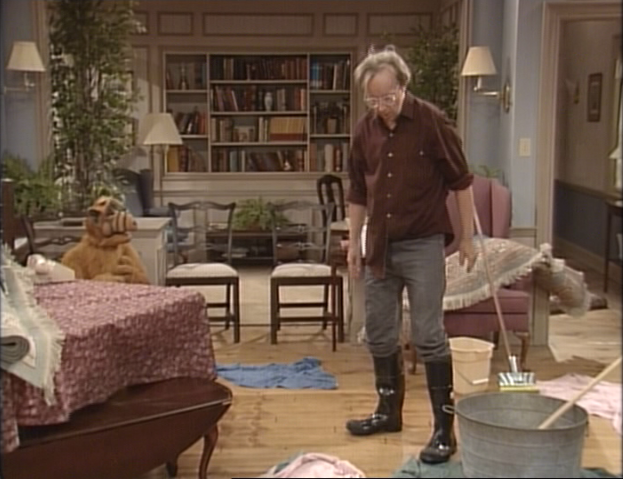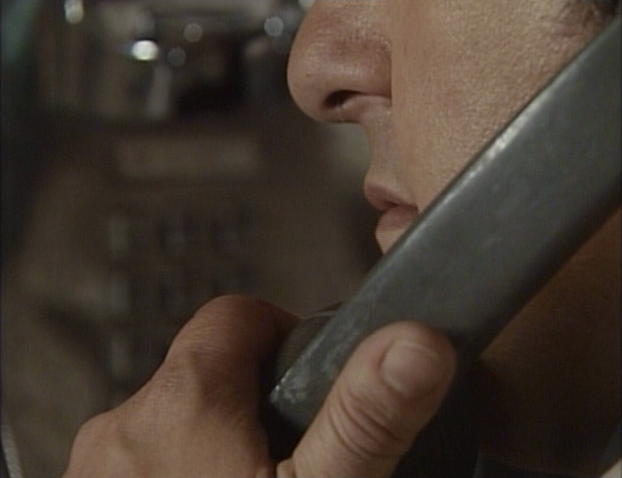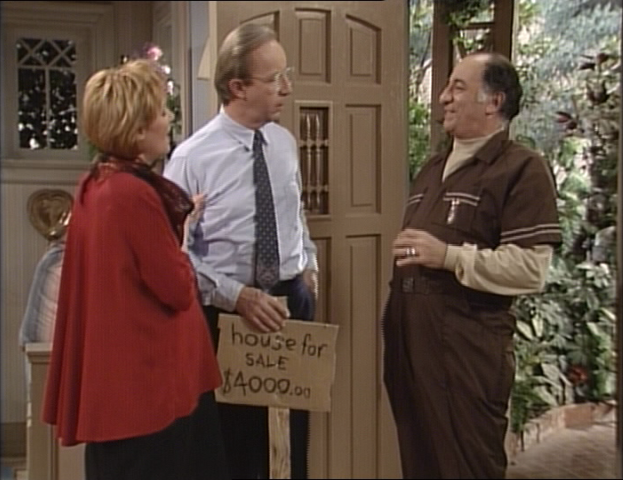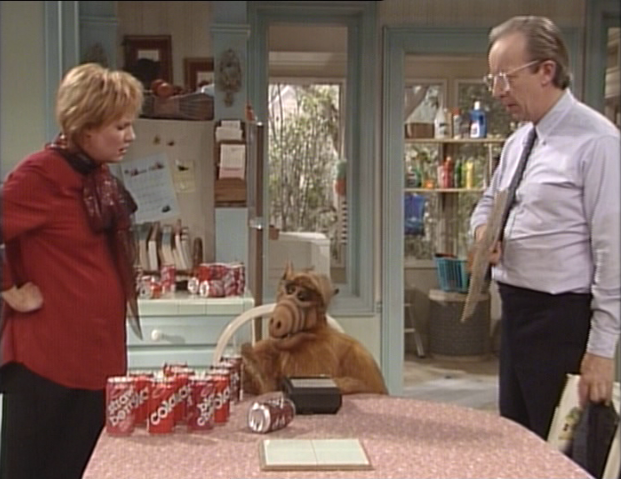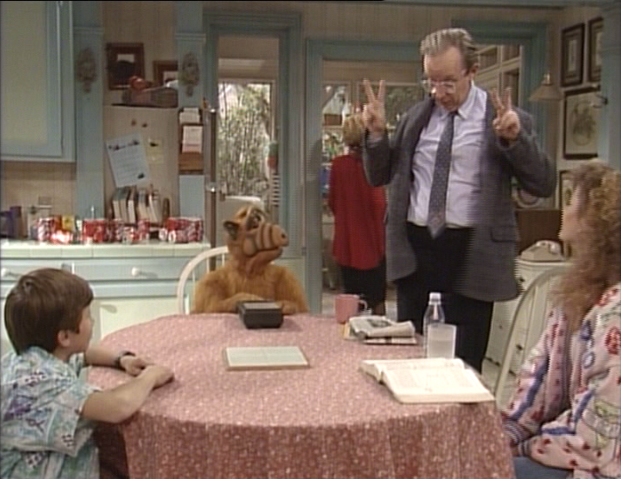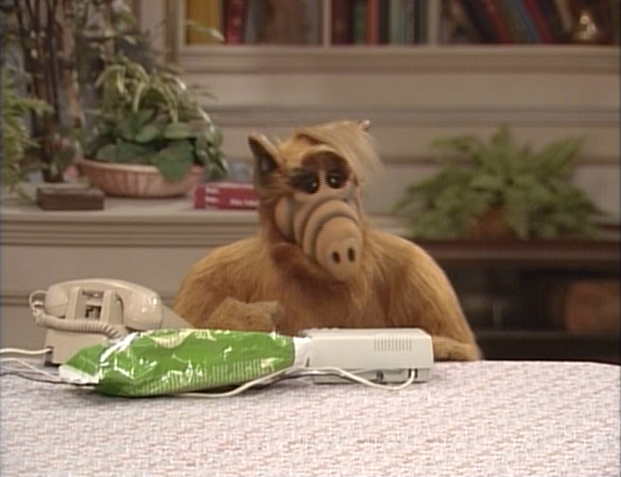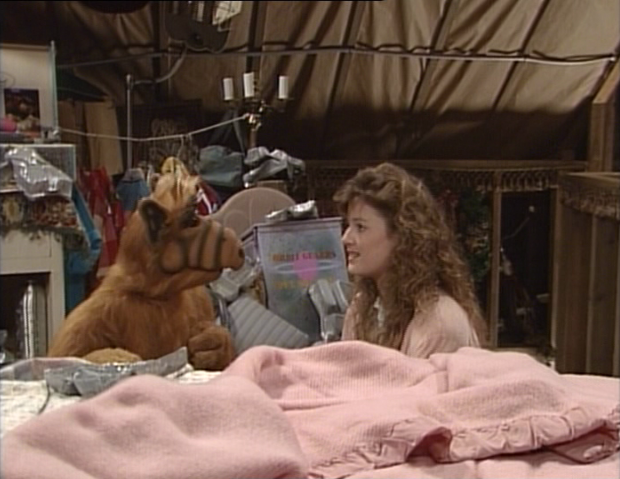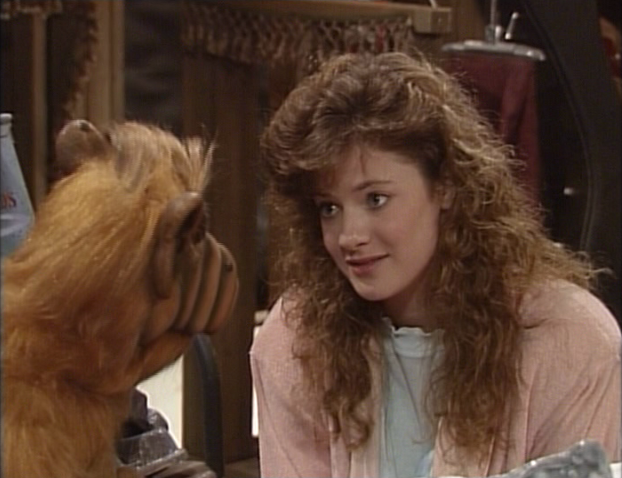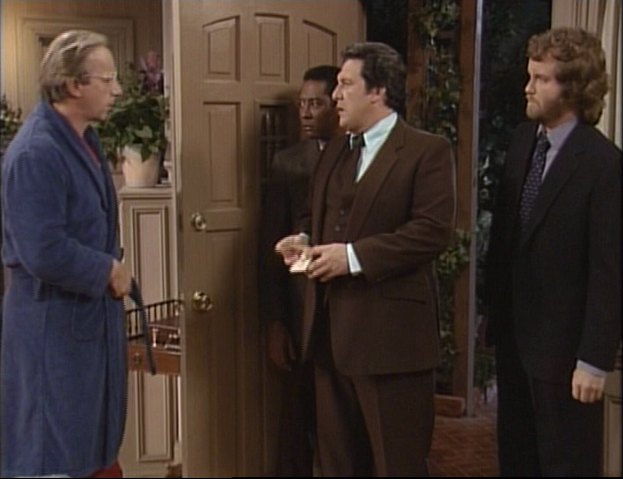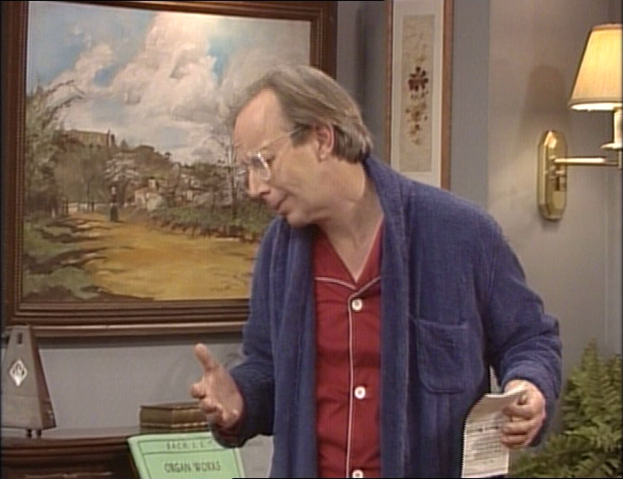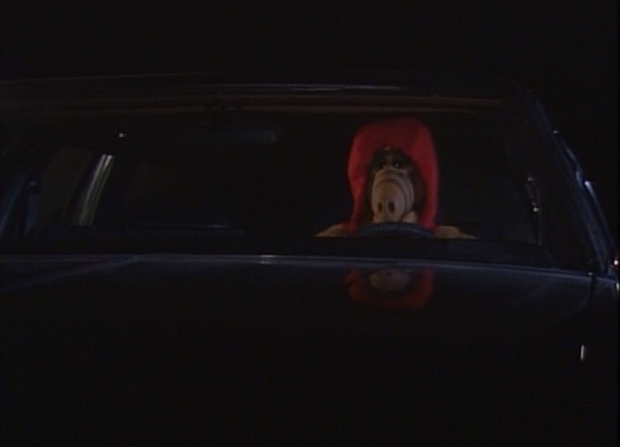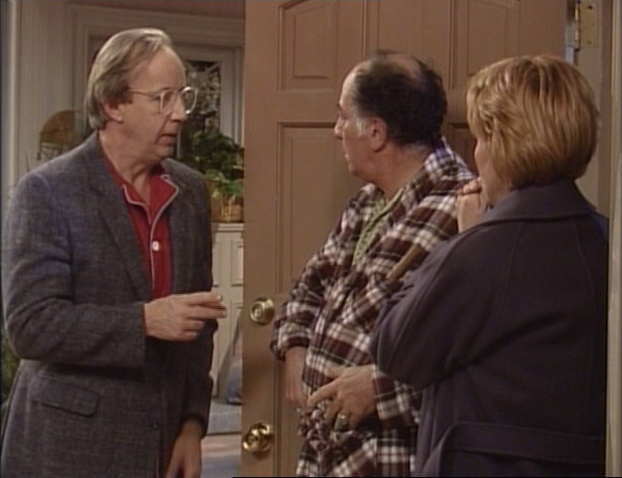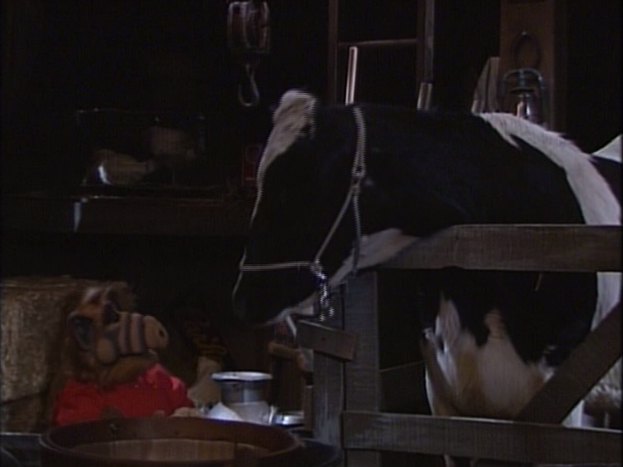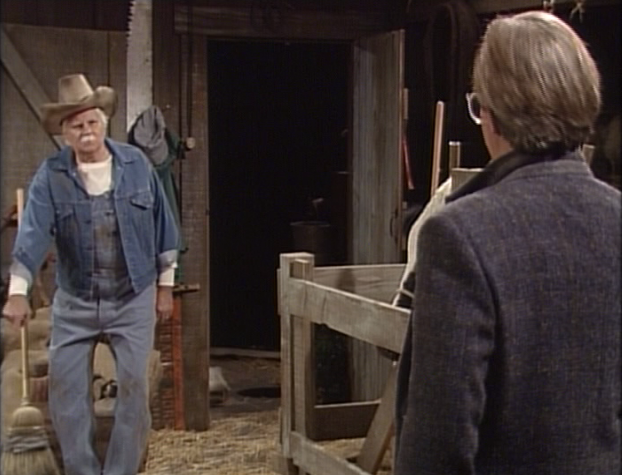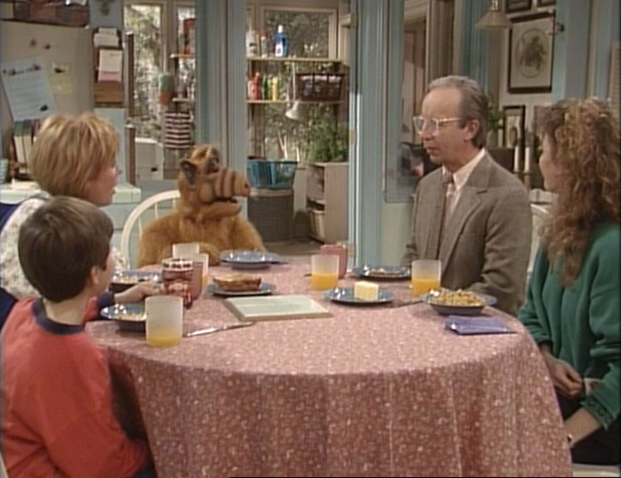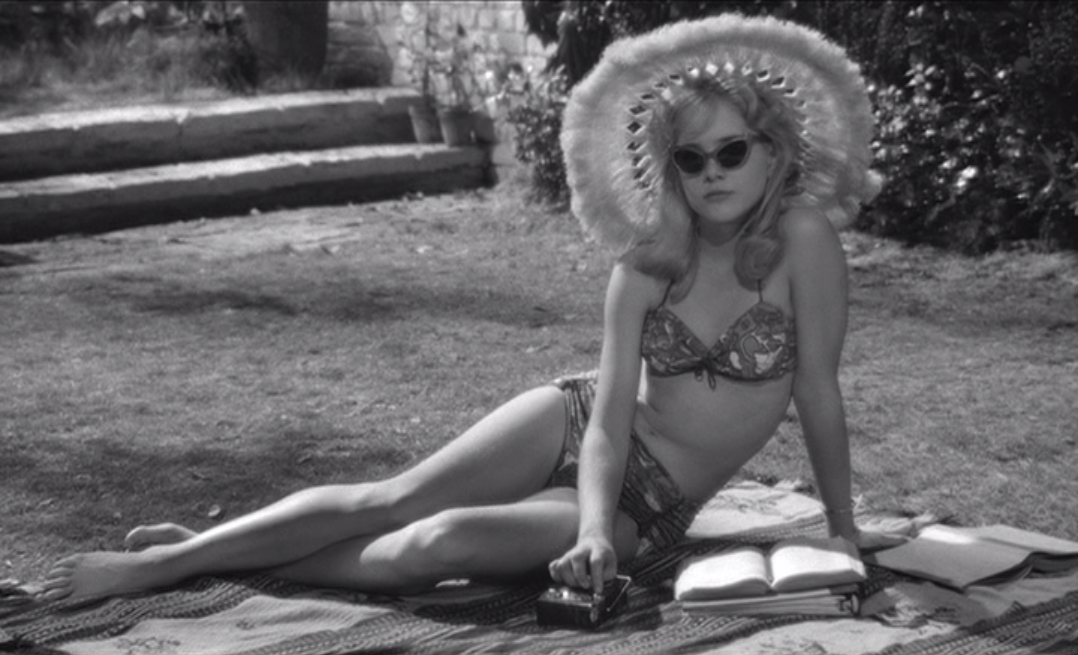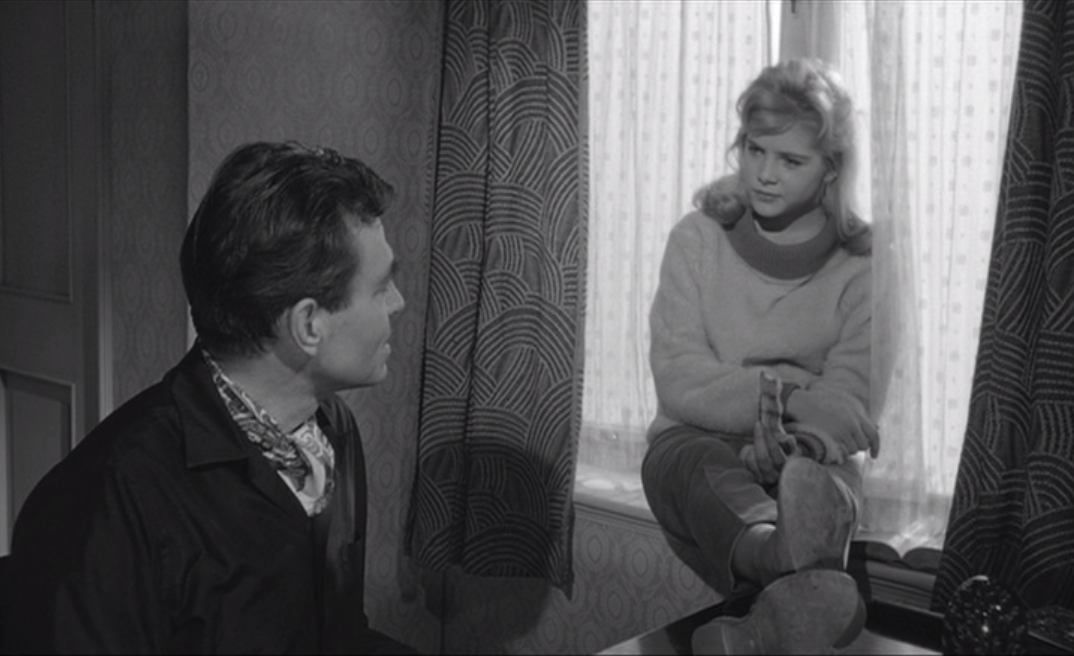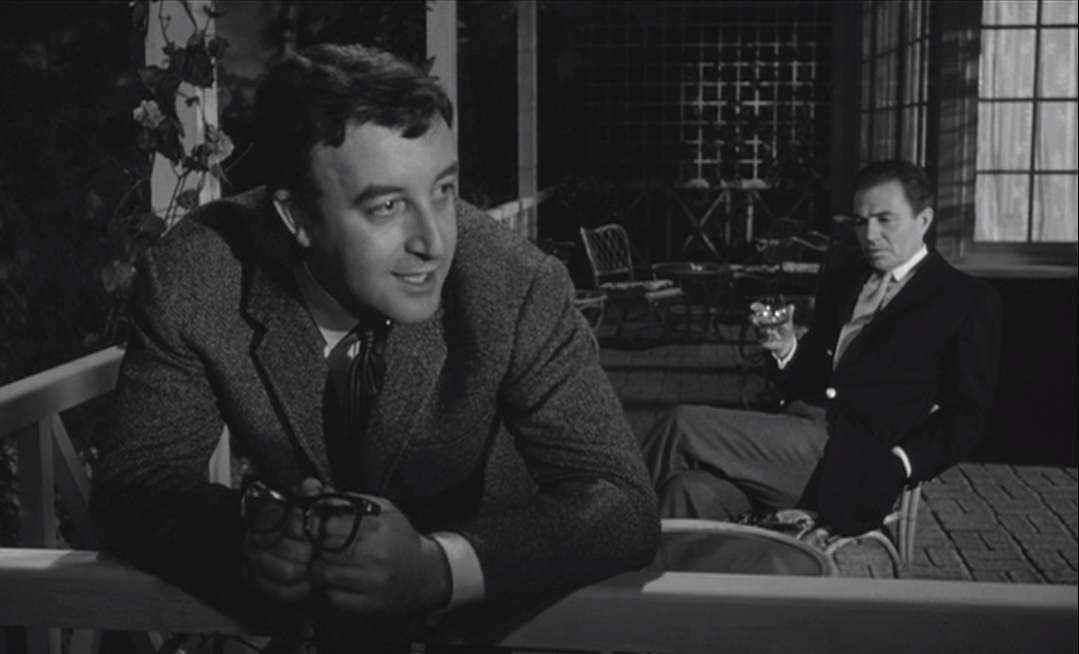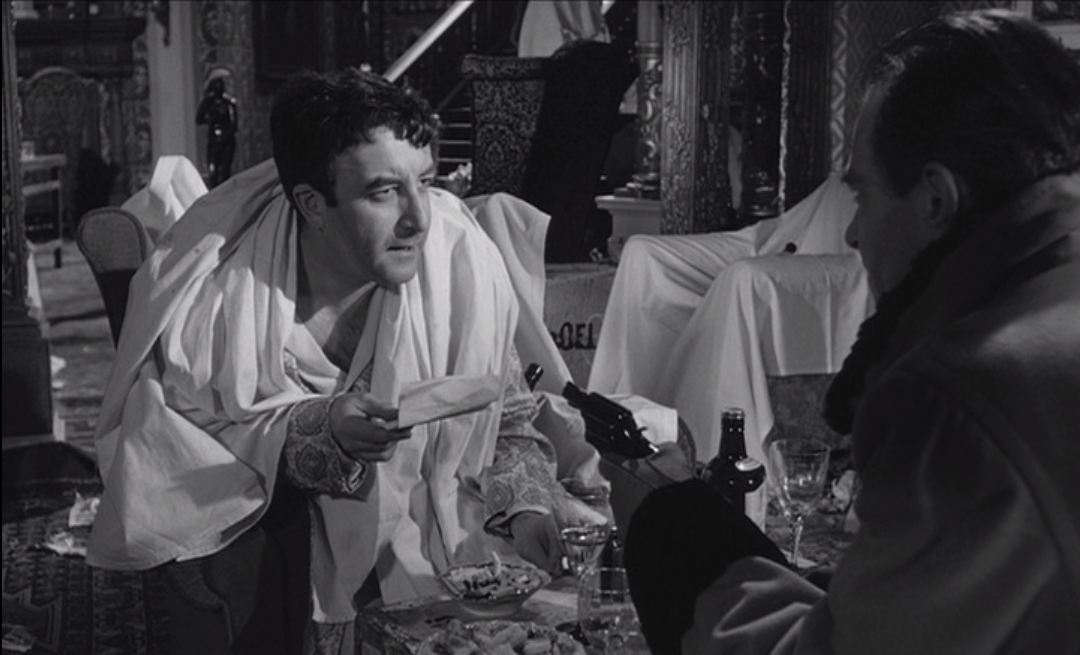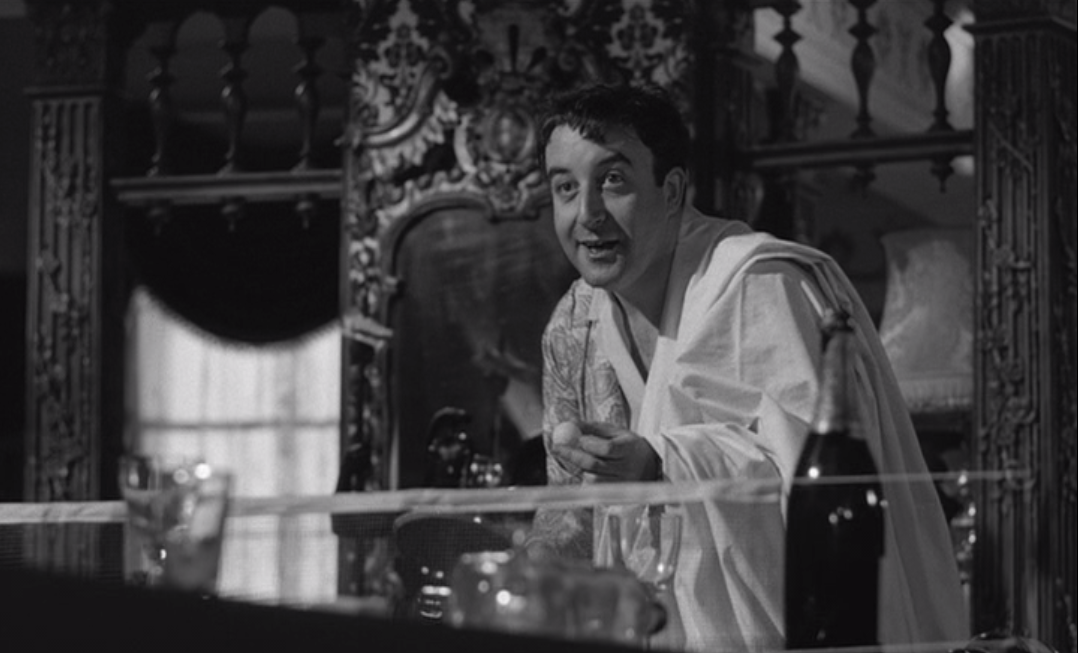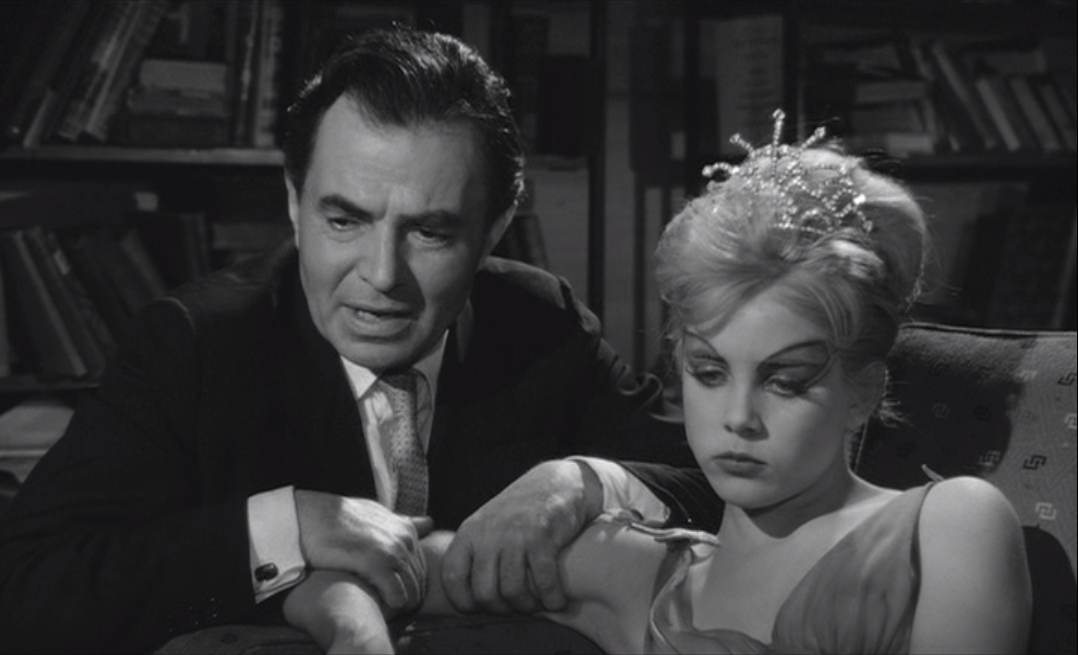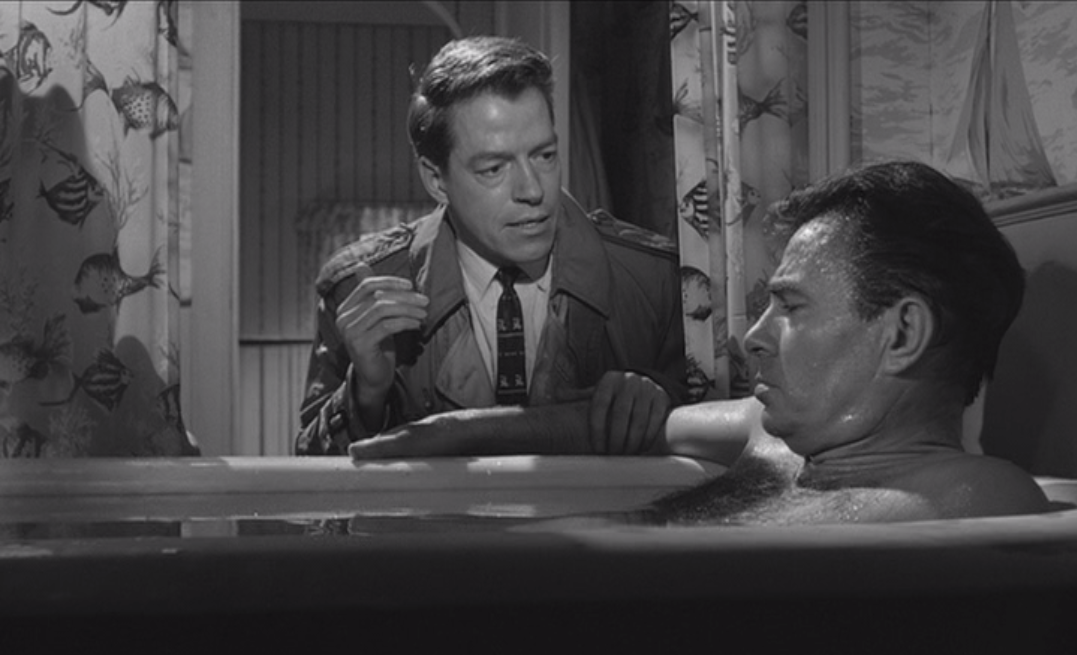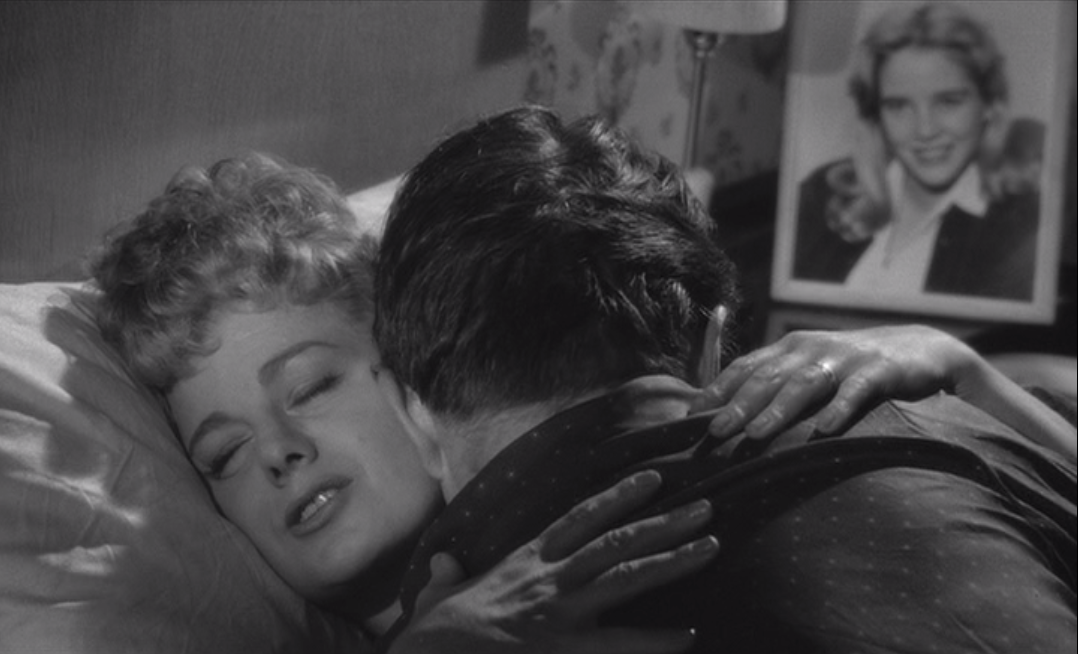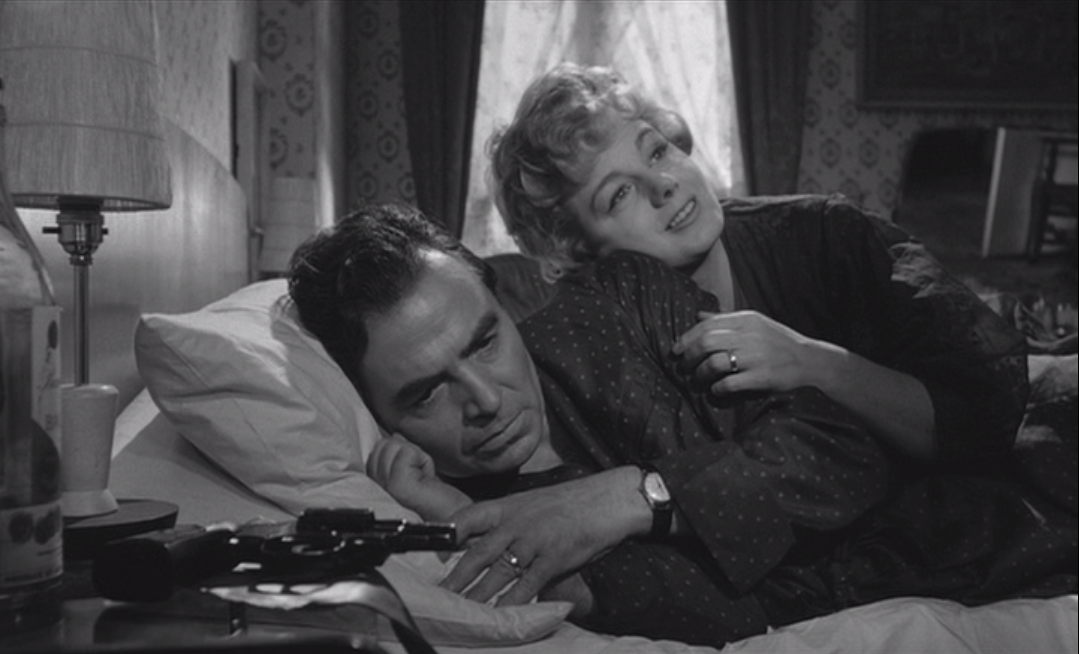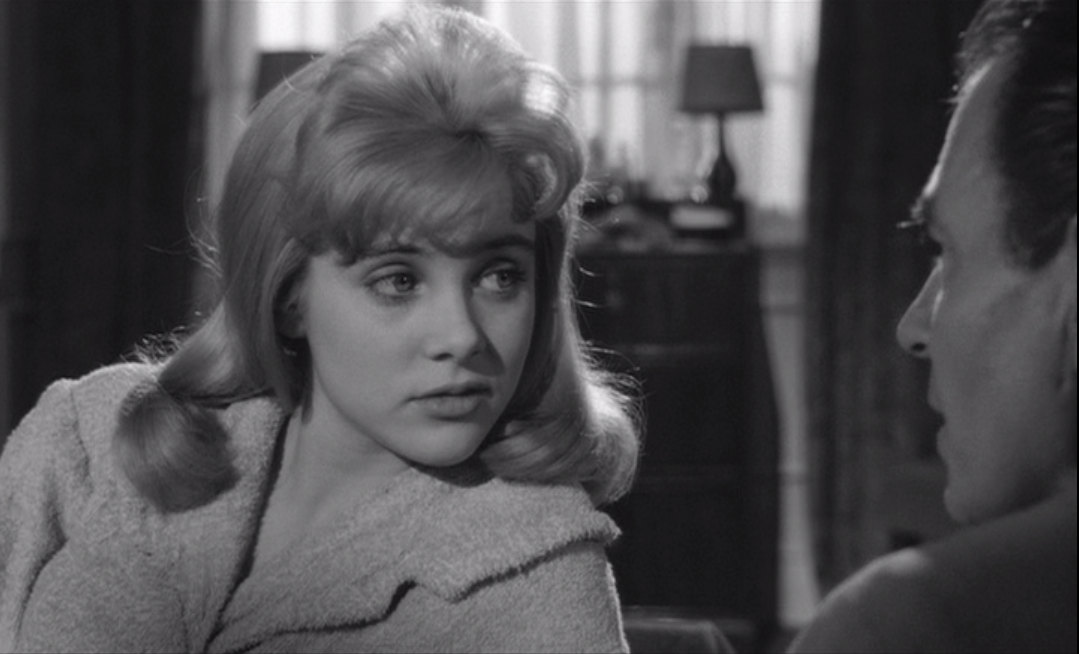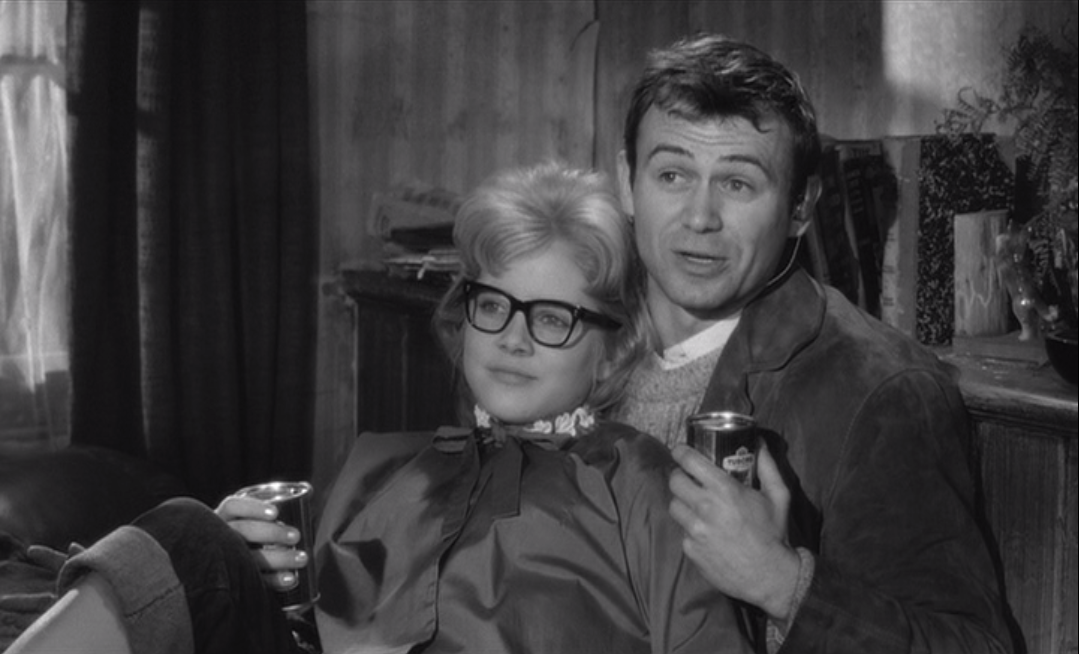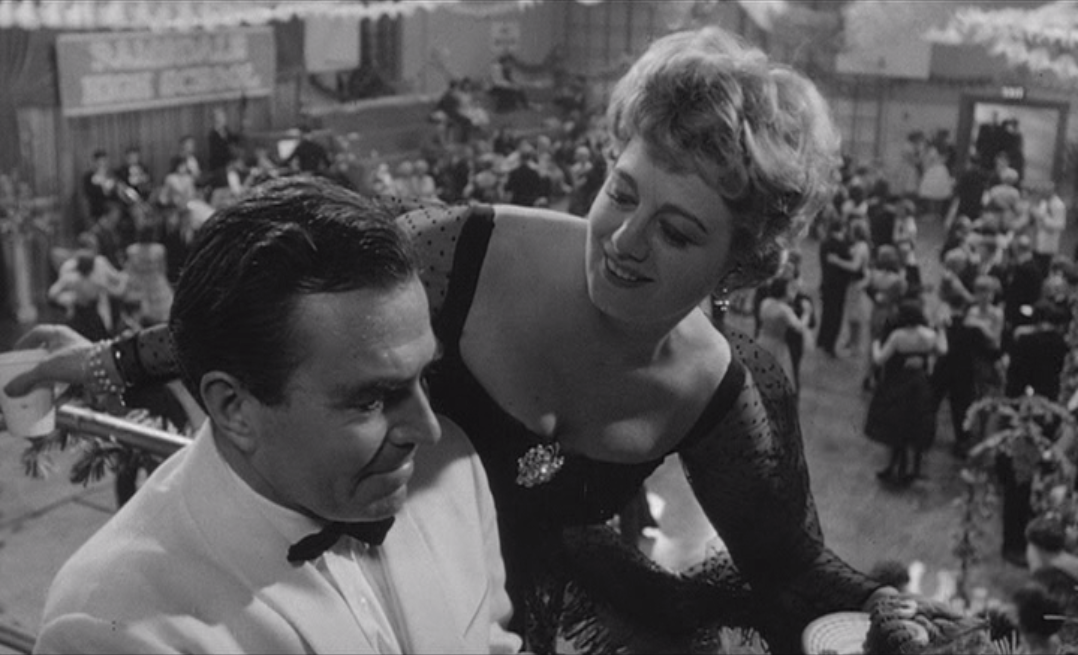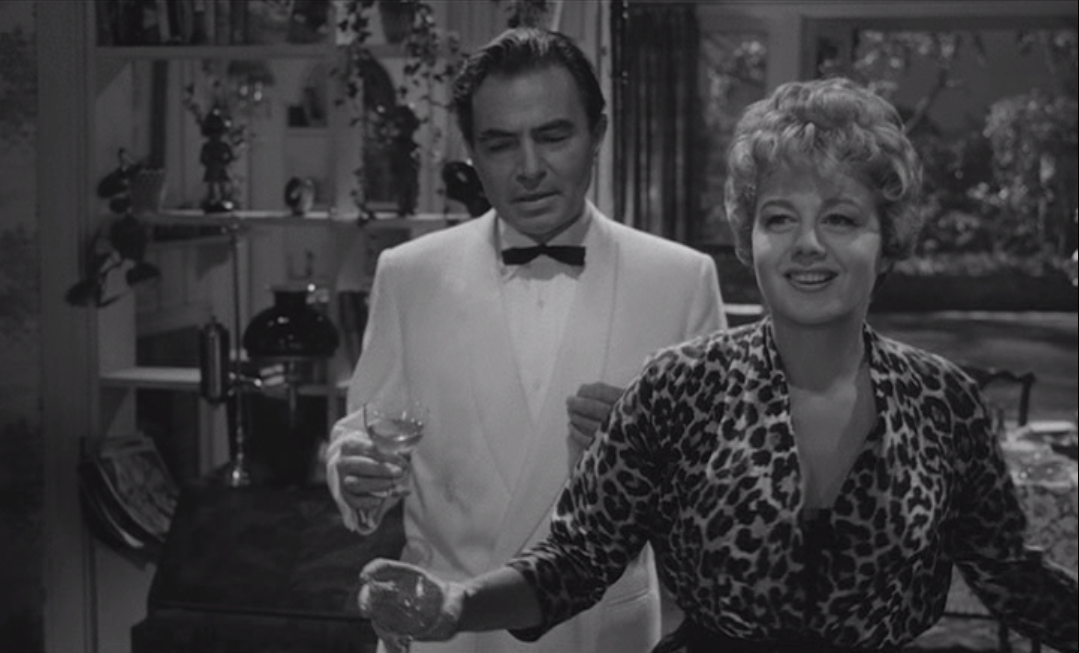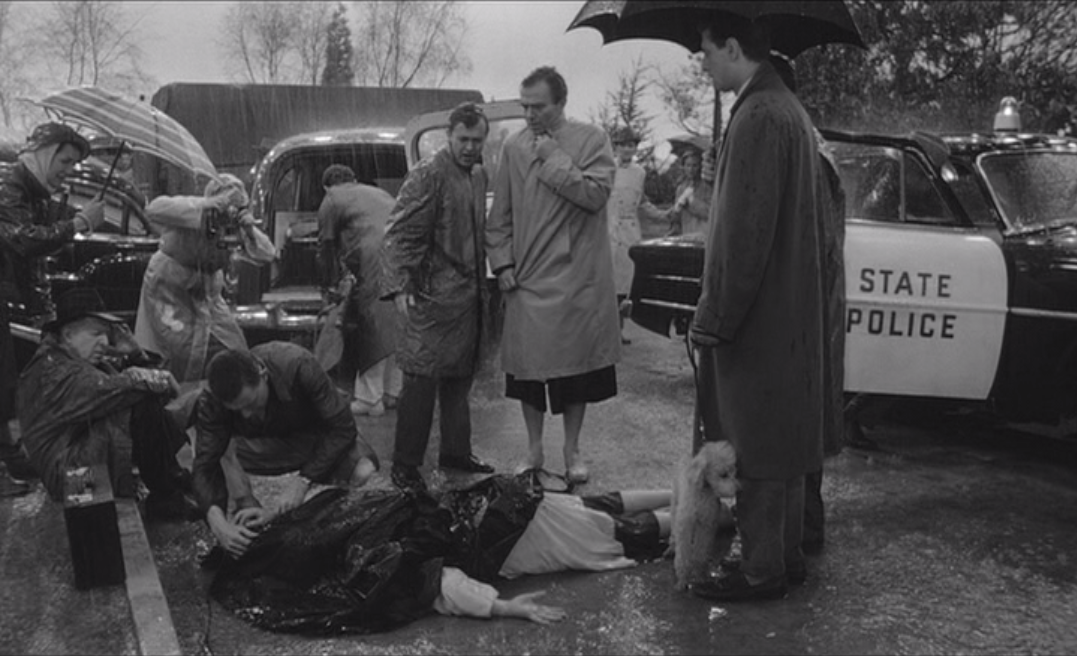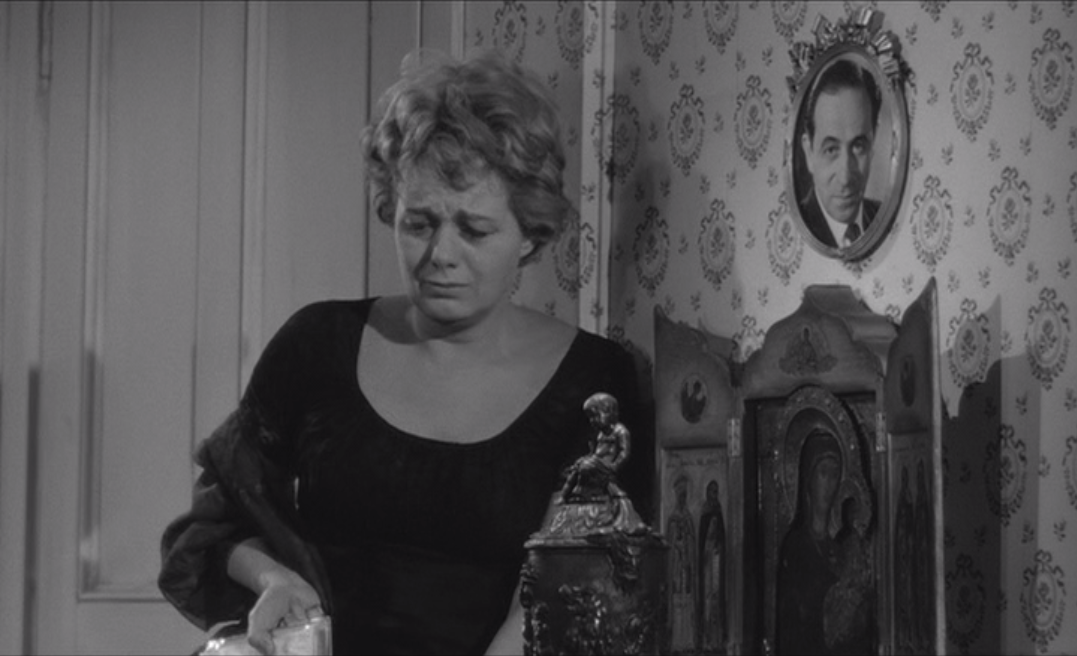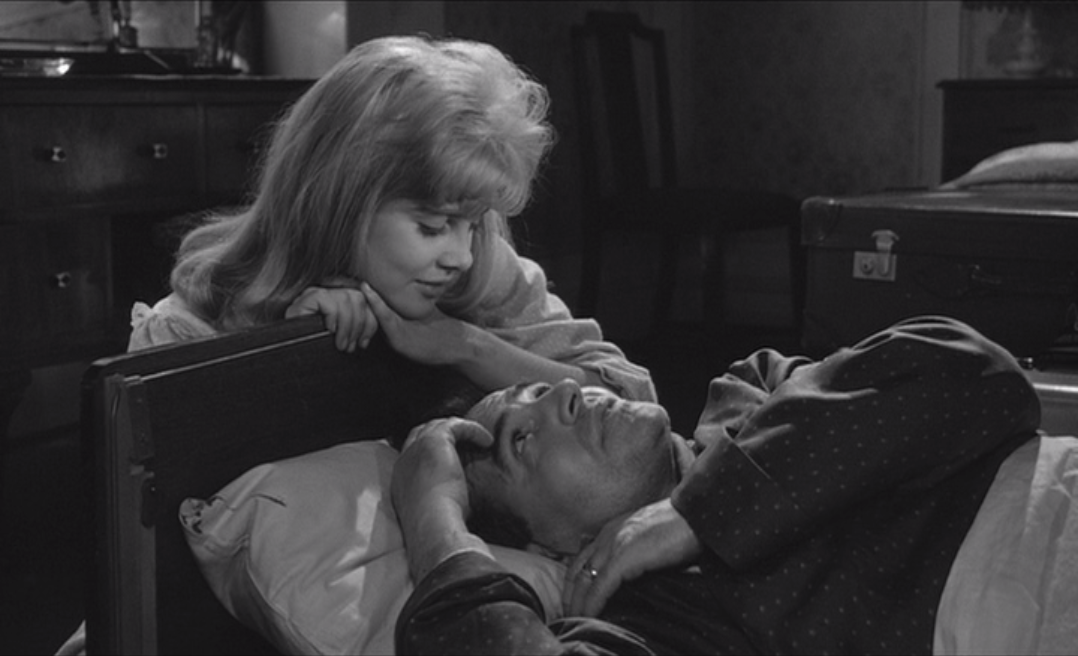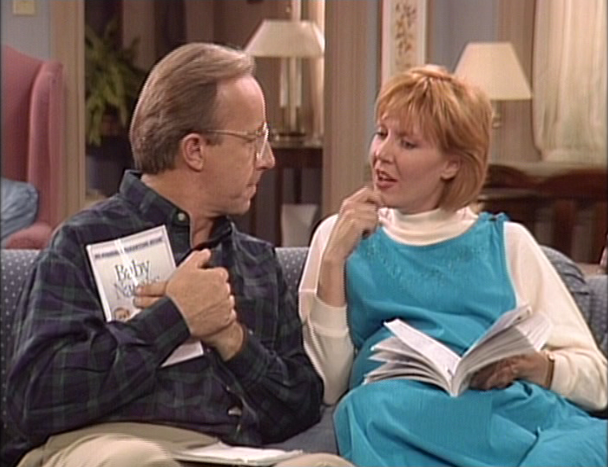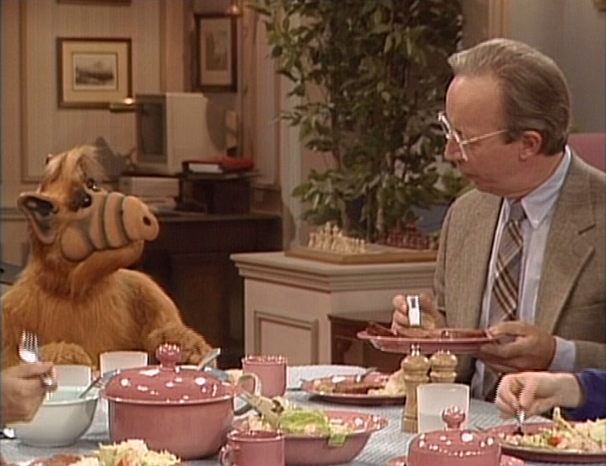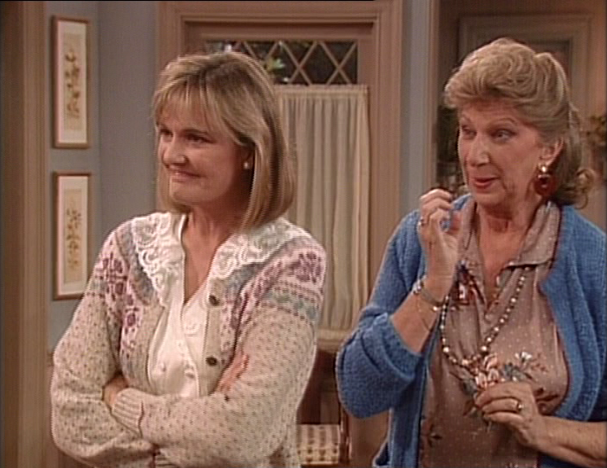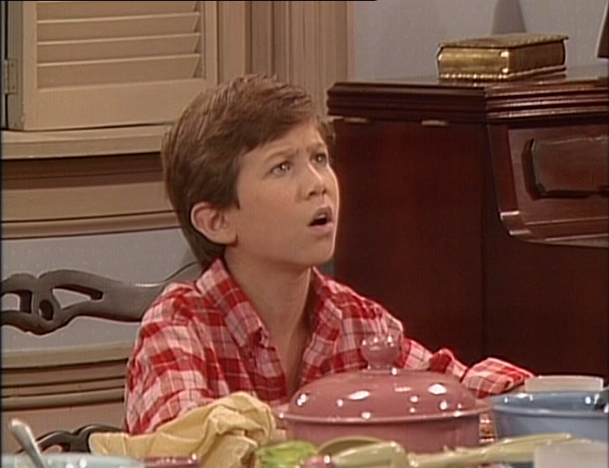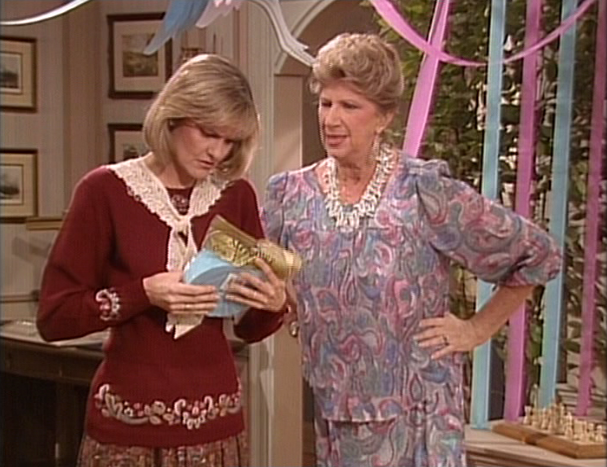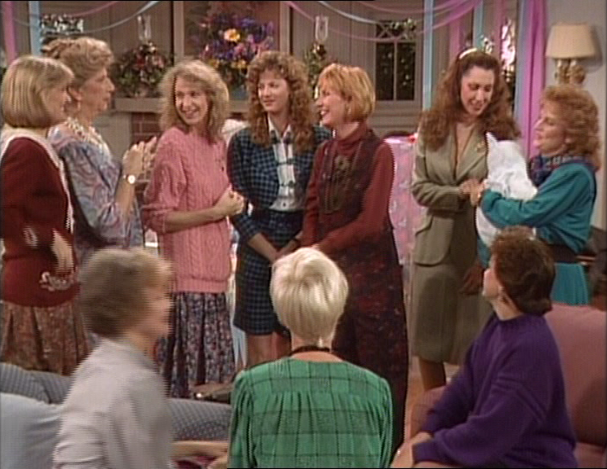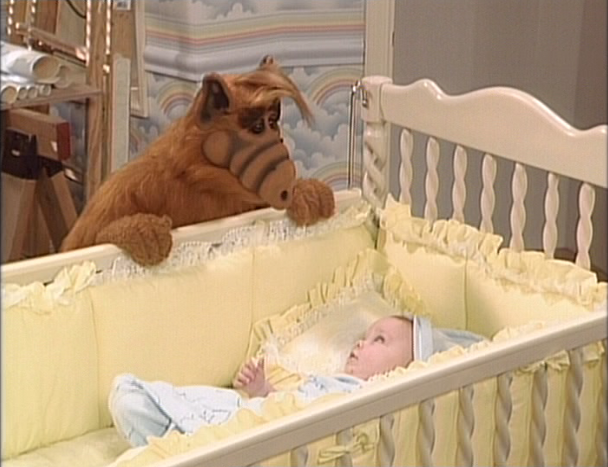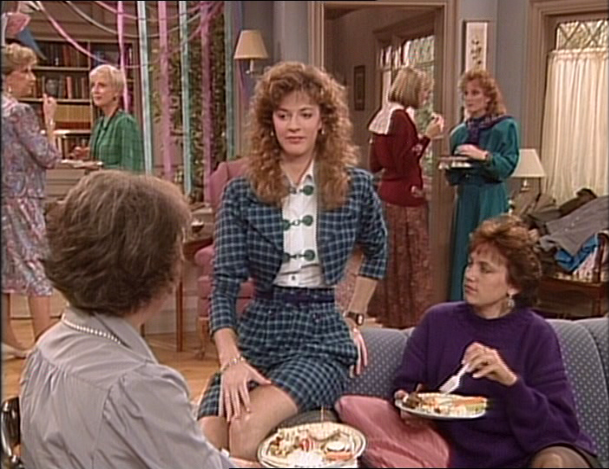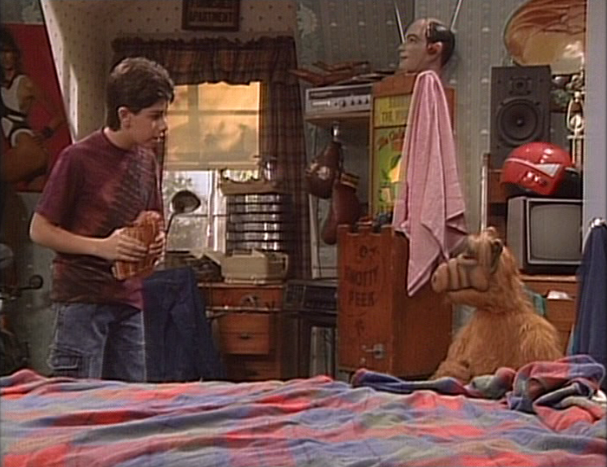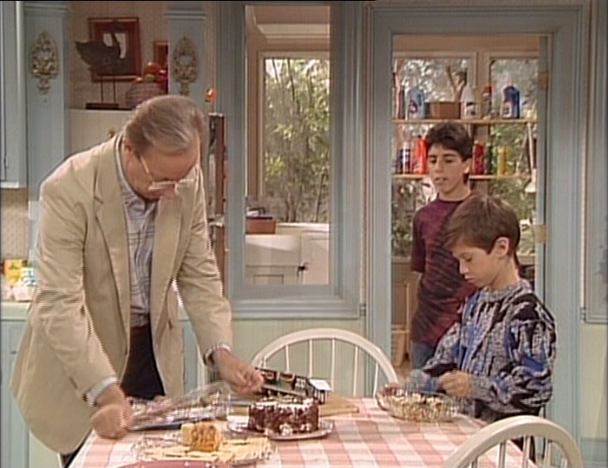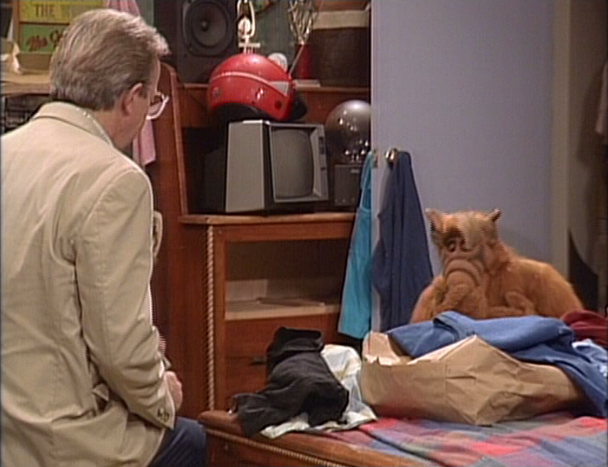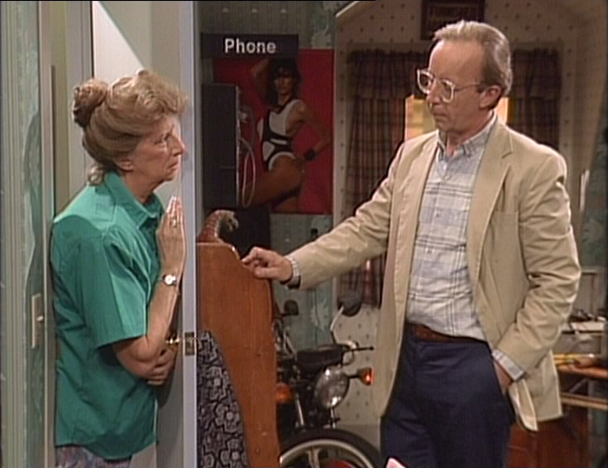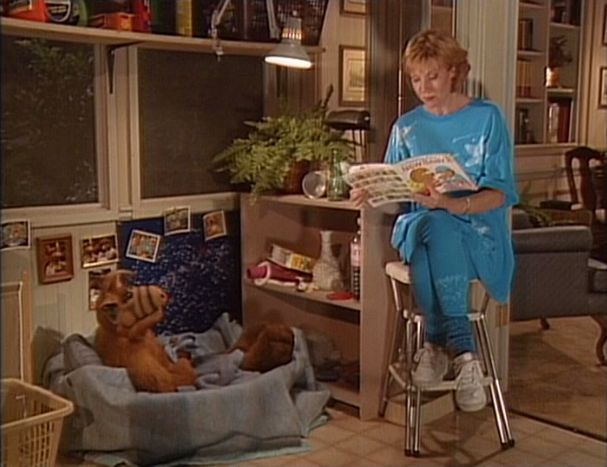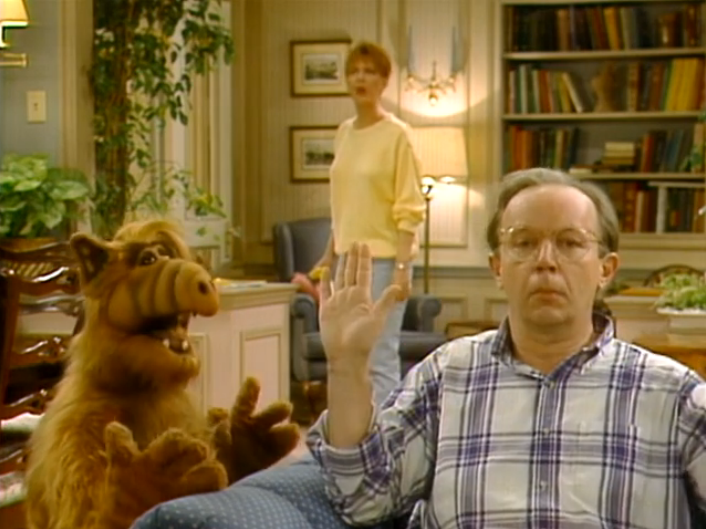First off, apologies in advance for any typos; I’m writing this with a pretty high fever. I thought about skipping a week until I felt better, but since you guys put up with my self-indulgent smarty-pants rambling about Kubrick’s adaptation of Lolita, the least I can do in return is make fun of a puppet show for you.
In all seriousness, I had originally considered Fiction into Film to be the replacement series (at least for a while) after the ALF reviews ended. That may still happen, but you’ll get a few of them ahead of that time, since it’s something I’ve wanted to do for a while and I finally have time to read again.
The end of this series is slowly creeping in on us, so while I’m not entirely sure what I’ll do next (I’m open to suggestions, by the boo), I will let you know how things are looking as we wind down.
For starters, “Running Scared” means that we’re down to the final 10 episodes of season 3. After that, obviously, I’ll do season 4. Then I’ll likely take a detour back to season one, with a few articles that will look at the major (and/or interesting) things cut from the syndicated versions of the episodes that I watched for these reviews.
Also, my DVD set apparently has an early, unaired version of the pilot that I’ll probably review for the purposes of comparing and contrasting. I say “apparently” because I can’t read German and I’m not sure where on the discs to look in order to find it…but if I have it, I’m reviewing it.
Then, if there’s any interest at all, I’ll host a live-stream of Project: ALF ahead of reviewing that. I figure that’ll make for a nice, communal way to celebrate the end of the series. And it’ll also prevent me from being the Only Person Ever Who Intentionally Watched Project: ALF.
So, there’s your peek into the future. As for the present? Well, we have “Running Scared,” which starts off great…and then ends somewhere else entirely.
I’ve found that I’ve said some variation of “This episode starts out very well…” a huge number of times. That either means that we should be happy that ALF so often hits the ground running, or frustrated that it so infrequently makes good on its own promise.
“Running Scared,” I will say right now, is immensely frustrating, because it feels like it’s a rewrite or two away from being a great episode. I’ve said things like that before, too, but here’s the reason “Running Scared” stands out as being especially frustrating: this is a story the show needed to tell.
We open with an unexpected, quiet pan over the living room, where we see that all of the furniture has been moved and towels are tossed all over the floor. Willie walks in from the kitchen in some galoshes, throws more towels down at his feet, and asks ALF to explain, again, please, what happened.
This is very, very good. See, ALF flooded the living room because he intended to freeze the water and create a skating rink. Maybe you find that funny on its own; I don’t have strong feelings either way. But what I love about it is the fact that we don’t see any of that. The cameras switch on not for the wacky antics, but for the aftermath.
In the first episode of this season (“Stop in the Name of Love”) the highlight was probably the scene in which we see Willie pulling banana peels out of the coffee maker. As I observed at the time, it’s funny because of the idea of ALF cramming them in there in the first place. Had we seen him doing it, it wouldn’t work; there’s nothing inherently funny about someone gumming up Willie’s percolater. Give us the germ of an idea (bananas + coffee maker), however, and the odds are high that we’ll visualize something funny on our own.
That’s what happens here, and it works, but it’s not all that happens here. When ALF replies to Willie, the way in which he delivers his lines compounds the joke very well. He suddenly becomes a little kid who is tired of having to apologize yet again for the same stupid thing he did, but knows he has to because somebody else is in charge, and he’s in deep shit.
It’s great. Giving us this episode’s “bananas in the coffee maker” equivalent would have been enough, but an ALF who is both irritated and apologetic provides an additional layer of comedy. I like it.
Max Wright, I’d love to report, is on point in this scene, but he’s really not. He’s okay, but we’ve seen him much better than this. His repeated calls for ALF to tell him, again, why the living fuck he did this are funny, but they’re funny because they’re funny in theory, rather than because he makes them funny.
Usually the problem with the cast is that they don’t know how to take sub-par material and make it funny. This time, sadly, the material is good and the acting doesn’t rise to it.
Before long Willie storms out of the house to buy a pump, and once he leaves the phone rings. It’s somebody asking forebodingly for Gordon Shumway, and, man, the Tanners really should have forbidden their secret space alien from placing and receiving phone calls, but they never did, because ba hoobie derby dee.
It’s some guy who says that he knows Shumway is an alien, and if he isn’t paid $3,000 by Friday, he’s going to turn ALF in to the authorities.
It’s creepy and all, yeah, but he’s obviously mistaken. Why does he think ALF is an alien? Hasn’t he been watching the show? I have, and I haven’t seen any evidence that he behaves in any more “alien” a way than any of the other characters. Weird. Huge continuity error here.
But seriously…yeah, this episode has my attention.
For all the bullshit ALF gets up to in the backyard, on top of the house, and sometimes all around Los Angeles…and in spite of there being neighborhood watches and nosy neighbors and a general idiotic carelessness on the part of all those who are cursed with the name Tanner, ALF has never really gotten himself into trouble. This is overdue. Since the first episode of season one we’ve been reminded of the fact that ALF can never, under any circumstances, get caught…while simultaneously watching both he and the family engage in moronic activities that should guarantee immediate capture. It’s about time ALF had to face a consequence like this. It is, as I’ve mentioned already, a story that needs to be told.
Sometimes, such as in “Alone Again Naturally” or “Someone to Watch Over Me,” he gets himself into a bind, but it’s never for long. Willie or someone is always there, within arm’s length of the situation, to quickly bail him out using shitty sitcom magic. There are no stakes, and aside from the odd cliffhanger deferring disappointment until the following week, no real sense of danger.
Not until now, at least.
For 66 consecutive episodes, this show has alternately ignored and dismantled its own premise. And all of that — without exaggeration, all of that — could be redeemed with just one episode that makes good on the promise. Placing ALF in real danger of exposure, as a result of his own / the family’s own carelessness, could redeem everything we’ve seen.
“I know this show seems stupid,” it would say, “but trust us. We know it, and we’re addressing it right now.”
It’s the show acknowledging the fact that these pieces have always been here, and taking the time, at last, to fit them together.
In short, I love this premise. “Running Scared” has me from this very first scene; it’s already funny, and it’s already interesting. Its central conflict is specific to the nature and situation of the main character, specific to the premise of the show, specific to the danger ALF is in with the Alien Task Force, and specific to the world we live in…after all, the guy on the phone hasn’t turned ALF in; he’s just shaking him down for some money. And why not? That’s the most identifiably human thing I’ve seen on this show in ages.
Granted, Mashy Magoo the Thanksgiving Hobo had the same idea, but he fell in love with ALF’s…whatever ALF has, before the Alien Task Force arrived. The idea of somebody finding a space alien and immediately thinking to profit from it is a believable one…and this time, the person with dollar signs in his eyes is going to see it through.
It’s good. Visually, too, the episode is keen to push its boundaries. We’ve only had two scenes so far (the slow living room pan and the extreme closeup on the blackmailer’s jaw) and they’ve both been uniquely shot. This isn’t standard sitcom stuff. As much as “ALF’s Special Christmas” wanted to convince me from the start that it was a Very Important Installment, “Running Scared” actually has me believing it. It’s showing me respect, it’s rewarding me for watching, and it’s hoping I come along for the ride; it isn’t dragging me along by the nostrils.
ALF even comments on the fact that Willie always pulls him out of a jam, acknowledging the shortcoming that’s robbed so many other episodes of their tension…but Willie’s not there. ALF looks around and sees the mess he made (WINK WINK), and realizes that he might not get the help he needs now.
Guys…I know we’ve only just made it to the intro credits, but this has the potential to be a really great episode. Surely it won’t let me down.
Surely!
Right, guys?
…?
The next morning Willie and Kate stumble into the living room. They talk about how ALF came into their room last night and apologized for everything he’s done wrong since he arrived three years ago…in alphabetical order. Obviously that’s something else that’s funnier to hear about than to actually witness firsthand, and, again, I like that. By ALF standards, this episode is showing remarkable restraint, and it’s better for it.
The most interesting thing about this scene is the reveal that ALF still hasn’t told the family. He’s convinced, apparently, that this will be the last straw, so in spite of ALF being in significantly more danger than he’s ever been before, it’s also the one time he can’t ask for help. Instead, he’s apologizing for all the other shit he’s pulled since he moved in, and that’s smart from a writing standpoint. It also echoes “Working My Way Back to You,” which was one of this series’ most pleasant surprises. So far “Running Scared” is a good episode channeling an even better one. I’m happy.
Then “Running Scared” gets a real laugh out of me, but I can’t really articulate why; all that happens is that Mr. Ochmonek shouts, “Hey, Tanners!” as he approaches the house. That’s happened at least a dozen times before, but something about it strikes me as funny this time. Maybe I’m just excited because the episode is already pretty good, so my favorite character showing up feels, for once, like a cherry on top rather than a reprieve.
He brings them a sign that was in their yard, which says that their house is for sale for $4,000. (ALF later explains, in a pretty good joke, that he tacked on the extra thousand because he felt the Tanners should get something out of it.)
Mr. Ochmonek was never portayed as the brightest bulb, but the fact that he really believes the Tanners would sell their home for four grand seems much too stupid for him, so I choose to believe that he’s just joking when he says he’ll buy it. Willie declines, and Mr. Ochmonek says he’ll pay $4,100, and Willie can have his lawnmower back…but that’s his final offer. Too stupid or not, that’s a good line.
Kate explains that someone must have made that sign as a prank. And, wow; how did it take these assholes so long to come up with that as an explanation for ALF’s nonsense? Seriously, it’s a good excuse, and not one that you need to explain any further. Kids are always doing idiotic, sometimes inexplicable, things just to be dicks.
Usually when ALF does some dumbass thing that they need to explain, they end up inventing some kind of explanation that is clearly a lie and just makes them look stupider. (This also, it’s worth noting, used to lead to some good Willie moments as he floundered on the spot, but the show put a stop to that as soon as it realized that it was actually being funny.)
So, yeah, when forced to provide an explanation for ALF’s antics, shrugging and saying, “I dunno, I guess some neighborhood kids did it” sure is the smarter approach.
In the kitchen ALF records an audio diary: “Captain’s Log: Stardate 2525. Man, I’m still alive.” Set aside the idiotic idea that ALF is hiding something from the Tanners by loudly recording himself talking about it in the next room, because the line is a really well-integrated music reference. (“In the Year 2525” by Zager and Evans, if you didn’t know…it’s a monumentally shitty song, but Futurama had some great fun with a parody version.)
It’s also more clever than nearly any of ALF’s other pop culture references; as he’s an alien, it really might be stardate 2525 to him. We have no idea, and the joke might be the coincidence of the song’s lyric mirroring his own situation rather than the simple flash of recognition upon which similar gags in this show often intend to coast.
So far, so good. Unfortunately, “Running Scared” is just building itself up to let us down.
Willie and Kate come in and see aluminum cans everywhere. Kate asks him what the fuck he’s doing drinking all that soda. He replies, “Currently, I’m recycling cans. In a short while, I’ll be recycling soda.” It’s…pretty funny actually.
For shit’s sake, “Running Scared,” stop tricking me into thinking you’re going to be good.
They confront him about the recycling and the FOR SALE sign, and he tries to dodge the issue of why he’s raising money by saying, “you never know when you’re going to have to pay off some extortionist.” Then he tries to cover it with a phony laugh, which Kate, as the only Tanner not to have suffered severe brain damage at some indeterminate point in the past, sees through.
Lynn comes in and says good morning, and Kate says, “Oh, no, not so far.” Schedeen’s delivery of the line is stellar.
ALF, cornered, has no choice but to explain himself. And, in a nice subversion, the family doesn’t believe him. They think he invented the blackmail story in order to hide whatever it is he really wants money for, with Willie taking care to use air quotes when referring to ALF’s “extortionist.”
It’s a nice way of evolving the story. Instead of ALF continuing to hide the problem, or the family learning about it here and taking some kind of action (either of which, admittedly, could still have made for a great episode), we get something even better. The family does learn about it, but thinks ALF just found a new way to be a pain in their asses…and ALF does break down and reach out to them for help, only to find himself rebuffed.
We get to see multiple consequences pan out, in other words. ALF keeping schtum or the family rallying around him would each lead to their own kinds of stories, but fairly predictable ones. Instead ALF blabs and the family fails to rally, which helps “Running Scared” to feel like it’s actually jumped the rails. It’s no longer a safe and secure sitcom formula; some threat to the show’s homeostasis was introduced, and the chance to address it has been fumbled. ALF had only one way out of this mess, but he wasn’t able to reach for it. Then he was forced into reaching for it…and it slipped out of his grasp.
ALF, in a word, is fucked.
He tells the Tanners that the blackmailer said he’d call back with further instructions on making the payment, and that the guy called him a pinhead. It’s an exposition dump that isn’t that funny, but he also reveals to Brian that he stole all the money out of his piggy bank, and Benji’s bitchface finally gets some proper context.
Later on, ALF is waiting by the phone with Kettle Chips. I’m not sure if this qualifies as product placement, especially since we can’t see the label this time around, but in “We Are Family” we could pretty clearly see that that’s what he was eating in the tub. Since name-brand products are usually relabeled in this show, I wonder.
Also, they’re really fucking good if you’ve never had them. Even if the subliminal suggestion here is that they taste an awful lot like delicious cat meat.
Anyway, the phone rings, and he lets the answering machine get it. Pretty boring sentence, I know, but it’s actually one of the best ALF moments ever.
The recording says, “Hi, this is Gordon Shumway. I’m dead right now. Please leave your name, address, and extortion demands at the beep, and I’ll get back to you probably never. As I said, I’m dead.”
Funny writing, solid delivery, perfect use of the awkward phrasings and pauses of outgoing messages.
It’s just Willie calling though. He’s calling from work to say he’ll be late, and do cut to him in a non-descript office, but nobody else is there and nothing’s going on. So all of those secretaries and bosses and colleagues that we’ve seen in various other episodes weren’t worth inviting back on the show. In fact, empty space around Willie is a perfectly acceptable substitute for all of them, which provides some telling insight into ALF‘s approach to characterization.
He tells ALF to change the message to something less insane, and ALF does, using the new message to tell people to stop terrorizing him, and to wait for the beep.
It’s a good scene over all, even if the second answering machine gag isn’t as strong (or as unexpected) as the first, but what’s mainly interesting to me is that the blackmailer doesn’t call back with instructions like he said he would.
I’m genuinely curious as to why…and I’m not saying that because I’m playing coy or anything. I’ve seen the episode. I know what happens. I know how all this shit plays out. And I still have no idea why the blackmailer says he’ll call ALF back the next morning and then doesn’t.
ALF lives in the attic so fuck that bullshit last week when Kate read The Berenstain Bears to him in the laundry basket whatever who fucking cares fuck
Lynn comes up because she saw his light was still on, and she finds him hovering in fear around the window.
She believes his story, or is at least willing to indulge him, whereas the rest of the family won’t. It’s a sweet moment, and my favorite incarnation of Lynn. One we haven’t seen in ages, actually. For quite a while in season two, Lynn served as ALF’s sobering voice of reason. She took the time to talk with him when nobody else would, and, as a result, formed a bond with him that felt almost human. It was, while it lasted, the most reliably satisfying relationship in the show, and seeing it resurface here reminds me of how much I miss it.
“Running Scared” doesn’t manage to live up to its own premise, but even if I hated it I’d have to give it credit for revisiting a lot of the things I like best about this show.
She calms him down by saying that the guy said he’d call back, and he didn’t. At no point does she completely buy into his story, but she at least believes that he’s not lying to the family. He is scared; that much is obvious to her. It’s just a question of how much she believes or doesn’t believe in the specific conclusions he drew.
Something’s up, but the nature of that something isn’t what’s important to her right now. Her friend needs her, and that’s what she reacts to, even though she doesn’t (and can’t) have all the facts.
Andrea Elson is by no means the best actress, which is why scenes like this give me the sense that she’s a genuinely warm and caring human being. These moments come naturally to her. She doesn’t struggle with her lines the way she usually does. She doesn’t sound confused or robotic; she doesn’t flub her timing or work visibly hard to remember what she’s supposed to say next. Acting, in other words, doesn’t come naturally to her, whereas warmth does.
Even a screengrab gets it across. Look at the picture above and compare it to almost any other time you see her on this show. She’s at ease here because she’s able to channel something she understands: an innate, hopeful goodness.
She leaves him for the night, and as soon as she’s gone the phone rings, because of course it does. It’s the blackmailer again, saying that the Tanners are fucked if ALF doesn’t pay him the money. Then he laughs and hangs up.
ALF makes some joke to nobody. “When the going gets tough, the tough get going. And so do I!!” Which I’m positive isn’t funny, but I’m in pain just trying to work out what he or the writers thought it meant.
What’s really odd though isn’t the fact that he called ALF so much later than he promised to, but that he also promised to give him payment instructions…and he didn’t.
So what exactly was his plan here?
It’s more than just a slightly illogical stumble…it’s the precise, sad moment at which you realize “Running Scared” doesn’t actually know what it’s doing.
At…some time of night on…some day, somebody pounds on the door and Willie and Kate go to answer it. It’s a trio of slumming character actors representing Immigration Services. They’ve received a tip that Willie is harboring an illegal alien.
And that was a twist I didn’t see coming. And it’s a great one. I’m surprised the show took this long to come around to the space alien/illegal alien joke, but the fact that it did take so long makes it legitimately unexpected when it finally does happen. And I like the fact that this isn’t the punchline of the episode; we didn’t build to a pun…instead the pun served as an evolution of the plot. And, in a way, the conflict.
I like this. I really, truly, genuinely do.
I want to make that very clear before we tumble into the trench of bullshit before us.
Ready? Here goes…
See, I’m admittedly fuzzy on the timeline, but as near as I can tell, here’s what’s happened: the blackmailer calls ALF, and says he wants $3,000 otherwise he’ll turn him in. He says that he will call back the next morning with instructions, but he doesn’t. Instead he calls that night, scares ALF all over again, and hangs up. Now he’s turned him in.
But…why? You need to give your extortionee the time — or at least the ability — to pay you, otherwise you don’t stand to extort anything. It’s weird, and it casts a shadow of confusion over everything we’ve seen so far. And it’s not one that episode ever clears up, even when the full extent of the scheme is revealed. (Spoiler: it’s not really full at all.)
The immigration guys come in to search the house, but Willie demands to see a warrant. His whimpering when they immediately show him one is his lone bright spot in the episode.
I’m wondering, though, why the standard immigration officers travel in trios, when the Alien Task Force has been shown to operate in pairs at the most. Aren’t space aliens more dangerous? At least potentially? Sure, they might all be fat little fartbags like ALF, but the Alien Task Force doesn’t know that. (If they did know that, they wouldn’t have a reason to operate.)
The point is that whatever alien life exists or doesn’t exist, the Alien Task Force is hunting down a very unknown adversary…so why does it operate like an even more routine organization than Immigration Services in Southern California?
Willie stomps around the living room screaming that THEY ARE LOOKING FOR A HUMAN ILLEGAL ALIEN, to remind you that you’re watching a really fucking terrible show, even though this episode might have tricked you briefly into believing otherwise.
The main immigration guy asks Kate if they have a basement or an attic. She says they do have an attic, but they just fumigated it.
Of course, as we learned in “Isn’t it Romantic?” they also have a basement, which is (some fucking how, for some fucking reason) where all of the furniture from the motel they stayed at during their honeymoon is kept. But Kate doesn’t mention a basement, because the writers don’t remember that episode, and for the first time I envy them.
Kate offers the man a fan if he needs to check the attic, but he tells her that that won’t be necessary. Then he calls to his two colleagues: “He’s in the attic.”
It would be a great moment if it weren’t punctuated by Willie writhing around like somebody just jammed a thumbtack into his spine.
The immigration guys go up to the attic, and while they’re gone the Tanners find a note from ALF. It’s a goodbye note, his fifty-eight by my count. In his letter he explains that he’d rather be turned into creamed chip beef than have the Tanners go to prison on his behalf. Of course, the exact opposite was the case in “Pennsylvania 6-5000,” but the writers don’t remember that episode, and for the second time I envy them.
The note also says that he took the car, and he promises to leave it on Highway 71, “just outside” Edwards Air Force Base.
One, maybe I’ve asked this before, but who in shit’s name taught ALF to drive? He’s not allowed to leave the house; when would he ever need to know how to operate a motor vehicle? Ugh, who fucking cares.
Two, Edwards Air Force Base is a real place. It’s around two hours from the center of LA by car, so, geographically, that checks out. However I wasn’t able to find a Highway 71 that ran anywhere near it. That could just be me, and I admittedly didn’t drill exhaustively through maps of the region, but if there isn’t really a Highway 71 near there, I’ll be pretty disappointed. After all, they went through the trouble of giving us an identifiable real-world location to cling to, but made up a supporting detail that could have just as easily been gotten right.
There’s a reason I’m digressing into a discussion of Edwards Air Force Base, and it’s not because I’m a picky fuckball. (I totally am, tho.) When Brian asks why ALF is heading that way, Lynn explains to him that that’s where the Alien Task Force is.
So hot damn…we have some more information about this idiotic organization. Here, again, is confirmation that they don’t operate in secret, as a teenage girl knows exactly where to find them. Bums know how to reach them by phone. Rewards for tips that lead to the capture of an alien are offered publicly. Oh, and if they see a crashed UFO on your roof they’ll ask if they can come in, but if you say no they’ll have to leave. So yeah, the Alien Task Force operates openly…which again raises the question of how that could be possible in a world that shuns and ridicules people who believe in aliens. (Poor Mrs. Ochmonek was driven insane by this very fact in “Take a Look at Me Now,” and I was in turn driven insane by having to review it.)
But, whatever, we’ve been through that before. The real meat here is the fact that the Alien Task Force is a one-location thing. They don’t have offices all over the country; there’s a singular, fixed address. What luck that ALF crash landed a couple of hours away from them and not, say, in Portland, Maine. They’d really be fucked, then.
Seriously, if you’re only going to patrol one city looking for aliens, you might as well not even bother. I wasn’t able to find the total number of cities in the world (for understandable reasons) but estimates peg it at around 3,000. So even if you knew that an alien would land in a city, there’s a 1 in 3000 chance that it’ll be the same city you chose to patrol. Of course, we don’t know that an alien won’t land in, say, a town. Or a village. Or a desert, or a forest, or the ocean. On top of that, we aren’t even sure aliens exist, so my completely reliable math says that even if the Alien Task Force operated with a 100% coverage rate of its chosen city, their chances of finding so much as a strand of ALF’s pubic hair are about six hundred thousand zillion to one.
So, yeah, your tax dollars at work.
Fucking Alien Task Force. You want to kill ALF! Why aren’t you the coolest thing in this show?!
Then we see ALF on his way to Edwards AFB. I wish he was listening to some music, though, because instead we have to sit through him amusing himself (he’s certainly not amusing us) with a series of monologues about what he might say to the Alien Task Force. If you think they’re anything but padded bullshit, you’ve not been watching ALF.
Then we go back to the Tanners, and, man, there’s really no winning with this dumbass show, is there? Cutting from the Tanners to the alien sucks, and cutting away from the alien and back to the Tanners again sucks. There’s really nowhere this show can go. Maybe if they cut away to Jake masturbating at his Knotty Peek machine I’d at least give them points for variety.
The main immigration guy explains to Willie how he found out they have an (illegal) alien: a name turned up on a mailing list, and their computers flagged it when it wasn’t tied to a social security number.
Now, I like about 25% of that, which is a pretty good amount for this show. ALF does indeed subscribe to magazines, and he orders all kinds of shit through the mail, so I’m happy that that’s how he was spotted. But I also know that the lack of a social security number thing is bunk. No computers anywhere are tracking that, and certainly no flags would go off if a social security number couldn’t be scraped up.
How many John Browns exist in the country? Are computers working ’round the clock to make sure that each of their subscriptions to TV Guide are linked to the correct social security number? Computers won’t be sorting through them to see who does and doesn’t have a social security number, and confirm that each is linked correctly to the right identity. And also, why would any publisher or mail order company do this on behalf of Immigration Services? I don’t think Fingerhut gives a shit who is buying their junk, and it certainly wouldn’t be cost-effective to perform rigorous background checks on every customer even if they did.
Additionally I get enough junk mail made out to Phlippi J Reed that I’m pretty sure they don’t try to deport people on the received end of clerical errors.
Willie, the fucking idiot, doesn’t ask whose name was on a mailing list…he instead asks who ratted them out, which is moronic even by the moronic standards of ALF & The Fuckass Morons, and acts essentially as a confession that he is indeed harboring an illegal alien.
But the main immigration guy ignores this obvious confirmation and instead calls him a pinhead, which conclusively proves to Willie that he’s the blackmailer. That rings massively false to me, because I refuse to believe that Willie is called a pinhead by any less than 90% of the population he regularly interacts with.
He apologizes to the immigration guy, but says he’ll have to ask him and Darryl and Darryl to leave, which is a reference to Newhart. Man, was this show dying to get Bob Newhart to guest star or something? Thank Christ Bob never sunk anywhere near that low. Can you imagine him playing second banana to fucking ALF?
Thank God we were spared the episode in which ALF becomes a telephone psychic while Bob Newhart plays the guy who stands quietly to the side while the puppet gets all the jokes.
Mr. Ochmonek comes over to find out what all the commotion was. Yes, in the middle of the night Mr. Ochmonek gets up and heads over to check on the Tanners, who regularly wish illness and death upon him, just to make sure they’re alright. Remind me again who the bad neighbors are.
Willie explains it was immigration, and Mr. Ochmonek offers to help. He says his cousin’s a lawyer. “Call this number,” he says, handing Willie a card, “and ask for inmate 24601.” I love you, John LaMotta. I don’t know why you’re even in this shitty ass shitshow for shits, but I’m so glad you are. So, yes, that was a legitimately funny line, but at its core he’s offering a family favor to Willie the moment he finds out he’s in trouble. Remind me, again, who the bad neighbors are.
They ask Mr. Ochmonek if they can borrow his car, and he asks, “Again?” This could have been a callback to “Fight Back” a few weeks ago, but instead they’re referring to a time off-camera that somebody had filled Willie’s gas tank with malted milkballs. So, of course, but he loans them the car yet again, without any kind of explanation of what they need it for or when they’ll be back. Remind me…again…who the bad neighbors are.
Willie and Kate grab his keys and leave without so much as a thank you, and the scene ends with Mr. Ochmonek standing in their open doorway, so I guess he’s also about to babysit their kids.
REMIND ME AGAIN WHO THE BAD NEIGHBORS ARE
Then ALF is in a barn.
Hey, why not.
He’s hollering about needing to use the phone because he ran out of gas, trying to get someone’s attention.
Normally I’d complain about this behavior, but since he’s on his way to turn himself in anyway, I guess it makes sense that he wouldn’t feel the need to be as cautious. Then again, if this fucking monstrosity knocked on a door in rural America in the middle of the night, the odds of him being shot to death on the spot are 100%. He’s even got on a red hoodie…and, no joke, Willie finds him because he leaves a trail of candy wrappers. I can’t confirm for sure that they were Skittles.
Willie stumbles in and finds ALF. Thanks to the candy wrappers I’m not concerned with how he found him, but I call bullshit on the fact that he was somehow only 40 seconds behind the alien who left hours earlier.
They talk for a while and Willie says that instead of running off, ALF should have come to them. ALF reminds him that he did, and they didn’t believe he was in trouble. So, yeah, they’re all assholes.
Then a farmer comes in and ALF hides. Willie picks up a pitchfork to stab this elderly man to death in the middle of the night, like the truly stellar social worker he definitely is.
After they decide not to engage in a rural California pitchforking to the death, Willie tells the man that he ran out of gas, and the farmer offers to give him some for $20. It’s actually funnier than it sounds, but not enough to warrant me typing this shit out.
When the farmer leaves ALF and Willie discuss how to get the cars home, then ALF says goodbye to the cow and tells it to watch its cholesterol.
That was the punchline of the entire episode. “Running Scared,” everyone.
This is where we end up after the blackmail plot, the great Lynn scene, and the alien/alien confusion?
God dammit. This is what I get for getting my hopes up. ALF giving life advice to a cow.
In the short scene before the credits Willie announces to us all that the main immigration guy is in deep shit for shaking down illegal immigrants. Evidently he’s been blackmailing them for a while now, so I can see why he’s fired. Why the family is no longer under legitimate investigation for housing illegal immigrants, though, is conveniently not addressed. I guess once the blackmailers are out of the picture, Immigration Services reverts to the honor system embraced by the Alien Task Force.
It’s strange; if the guy’s been dismissed for shaking down illegal immigrants, what did Willie do? Tell them that he was being shaken down for harboring illegal immigrants? Probably not, of course, but how could he escape any kind of followup visit, at least to close the file?
Whatever. Everything’s back to shitty normal.
ALF thanks Willie for saving his life.
Nobody thanks Mr. Ochmonek for coming over, offering his help, loaning them the car, and babysitting their fucking kids, all without explanation, for allowing that rescue to happen.
Hey, Tanners! FUCK YOU
I don’t know. I’m sure I’m reading too much into it, but the whole final scene feels like Willie is just saying, “Don’t worry, everyone. We’ll never have to deal with a plot like that again. Next week we’ll be back to ALF eating train sets and shitting them all over the rug, just the way we like it.”
“Running Scared,” again, was a story that needed to be told. But mother of Christ it did not need to be told like this.
MELMAC FACTS: The Alien Task Force operates out of, or at least rents a loft at, Edwards Air Force Base.
